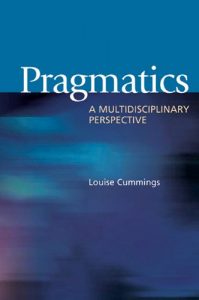The first truly multidisciplinary text of its kind, this book offers an original analysis of the current state of linguistic pragmatics. Cummings argues that no study of pragmatics can reasonably neglect the historical and contemporary influences on this discipline of neighboring fields of inquiry, particularly philosophy, psychology, artificial intelligence, and language pathology. By the same token, these fields can begin to address their own questions more productively by examining the insights of pragmatics. The book's range of topics and depth of analysis will be of interest to advanced undergraduate and more specialized readers in linguistics, communication studies, speech and language therapy, and cognitive science. Topics discussed include:
*coverage of pragmatic concepts and theories;
*criticisms of Sperber and Wilson's relevance theory, Habermas's theory of communicative competence, and Kasher's views on the modularity of pragmatics;
*pragmatic deficits in a range of child and adult language disorders; and
*a pragmatic analysis of argumentation in topical issues such as AIDS and BSE theories of meaning, inferences, pragmatics and AI.
*coverage of pragmatic concepts and theories;
*criticisms of Sperber and Wilson's relevance theory, Habermas's theory of communicative competence, and Kasher's views on the modularity of pragmatics;
*pragmatic deficits in a range of child and adult language disorders; and
*a pragmatic analysis of argumentation in topical issues such as AIDS and BSE theories of meaning, inferences, pragmatics and AI.






